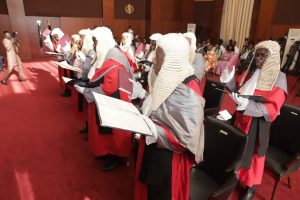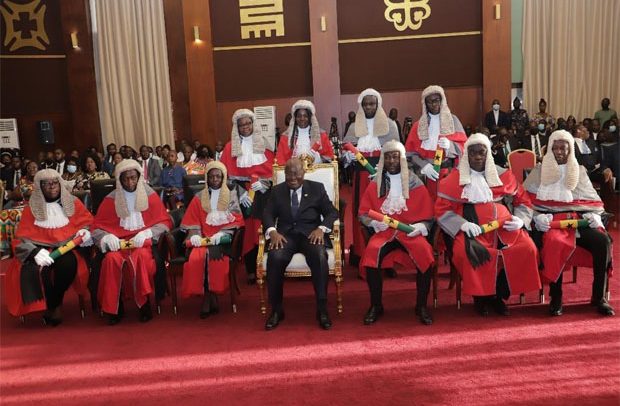President Akufo-Addo this evening swore in 10 new high court judges.
They included Ebenezer Osei-Darko, Bernard Bentil, Alexander Graham, and Mercy Adei Kotei, who were all Circuit Court judges who have been elevated to the Superior Court of Judicature.
The remaining are George Kwame Gyan-Kontoh, Richard Apietu, Eric Ansah Ankomah, Cynthia Martinson, Dr. Bridget Kafui Antonio-Apedzi, and Nabeela Naeema Wahab, all of whom were in private practice as lawyers and have now joined the bench.
In a speech after administering their oaths to them, President Akufo-Addo charged the ten newly appointed Justices of the High Court to eschew all forms and temptations of corruption throughout their journey as judges.
That, he said was because a judge who engages in corrupt practices will certainly be a societal threat.
He, therefore, asked the judges to ensure that they go about the adjudication of their cases in their courtrooms without fear or favour, ill-will, or affection.
“It is essential that you exhibit that you are honest, possess integrity, and sound knowledge of the law. A corrupt or incompetent judge is a danger to the public interest and judicial administration”, was how he put it.
Speaking on behalf of her colleagues and on her behalf, Justice Mercy Adei Kotei expressed gratitude to the government and people of Ghana for the confidence reposed in them.
“We promise to remain true to our oaths and to discharge our duties with diligence”, was their commitment.
Meanwhile, the President revealed that sixty (60) district courts, sixty (60) bungalows for judges, and three (3) new high courts for three (3) of the six (6) newly created regions will be commissioned before the start of the legal year in October.
Apart from that, he said the government, through the Administrator of the District Assembly Common Fund, is also constructing one hundred (100) new courts and bungalows for Judges in all sixteen (16) Regions of the country.
They will include twenty (20) courts and twenty (20) bungalows in Ashanti; twelve (12) courts and twelve (12) bungalows in Eastern; eight (8) courts and eight (8) bungalows in Greater Accra; eight (8) courts and eight (8) bungalows in Volta; eight (8) courts and eight (8) bungalows in Ahafo; seven (7) courts and seven (7) bungalows in Western; and five (5) courts and five (5) bungalows in Bono East.
The rest would be five (5) courts and five (5) bungalows in North East; four (4) courts and four (4) bungalows in Oti; four (4) courts and four (4) bungalows in Western North; four (4) courts and four (4) bungalows in Central; four (4) courts and four (4) bungalows in Bono; three (3) courts and three (3) bungalows in Northern; three (3) courts and three (3) bungalows in Savannah; three (3) courts and three (3) bungalows in Upper East; and two (2) courts and two (2) bungalows in Upper West.
According to him, “sixty percent (60%) of these courts and bungalows have been completed and will be commissioned before the start of the legal year in October. The remaining forty percent (40%) will be duly completed and commissioned by the end of the first quarter of 2023.”
Furthermore, he indicated that “six new Regional High Courts are also being constructed in the newly created regions, i.e., Ahafo, Bono East, North East, Oti, Savannah and Western North. Three of the Courts, that is those in Ahafo, Bono East, and Oti Regions, will be completed and ready for commissioning, again, before October. The other three, that is those in North East, Savannah and Western North, which are at eighty percent (80%) completion, will be ready for commissioning by the end of the first quarter of 2023.”
Sometime in April last year, the President cut the sod for the commencement of work on a new, modern Court of Appeal complex in Kumasi, together with twenty (20) townhouses and a guesthouse to serve as permanent residences for Court of Appeal Judges based in Kumasi, who will be mandated to handle appeals from the northern part of the country.
President Akufo-Addo however noted that “they will be completed and commissioned in September”, adding that “two hundred and ten (210) vehicles were, earlier this year, distributed to all judges in the Supreme Court, Court of Appeal, High Courts and Lower Courts.”
These, he said are all initiatives being undertaken by the Government to strengthen the capacity of the Judiciary.

By Charles Takyi-Boadu,
Presidential Correspondent


